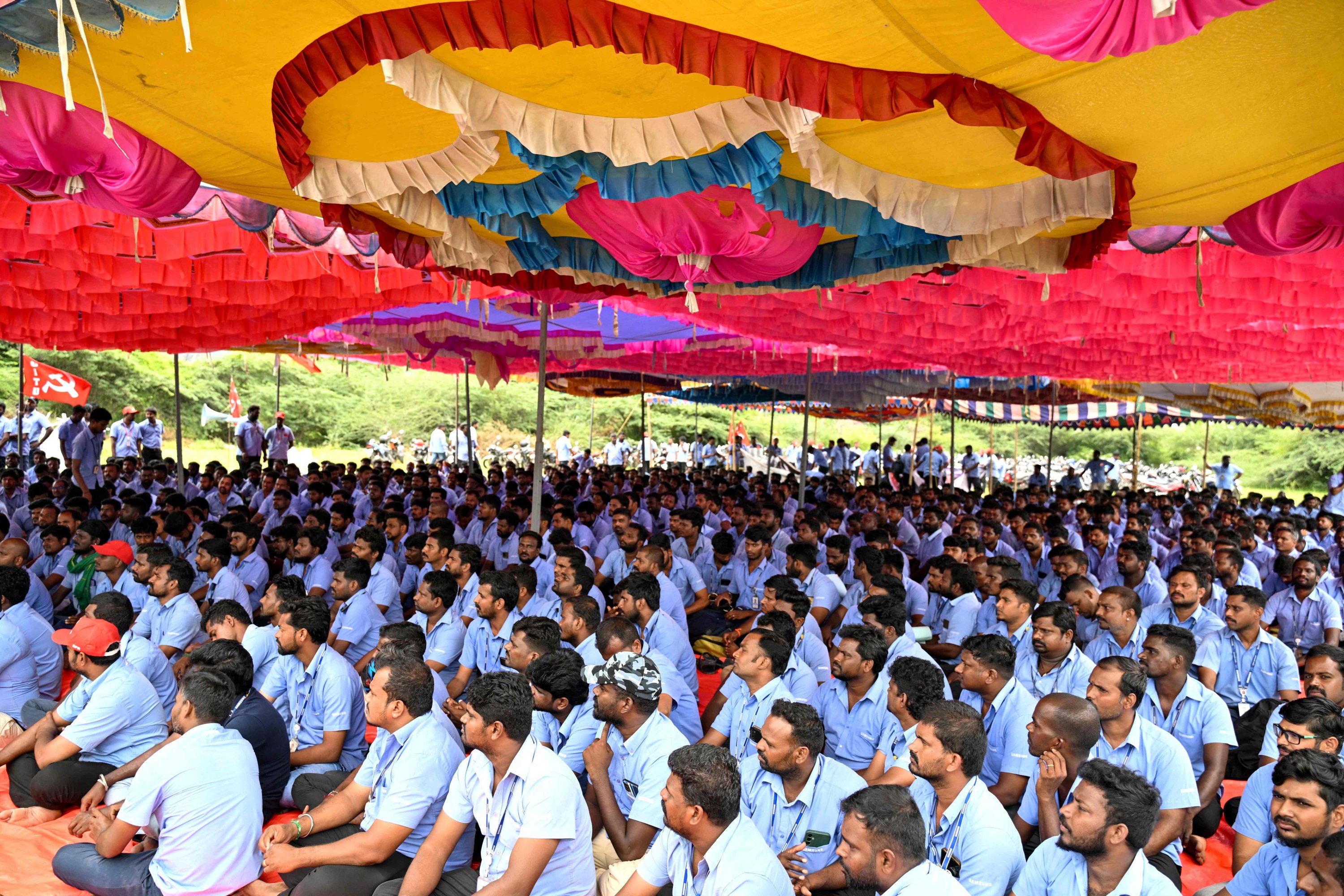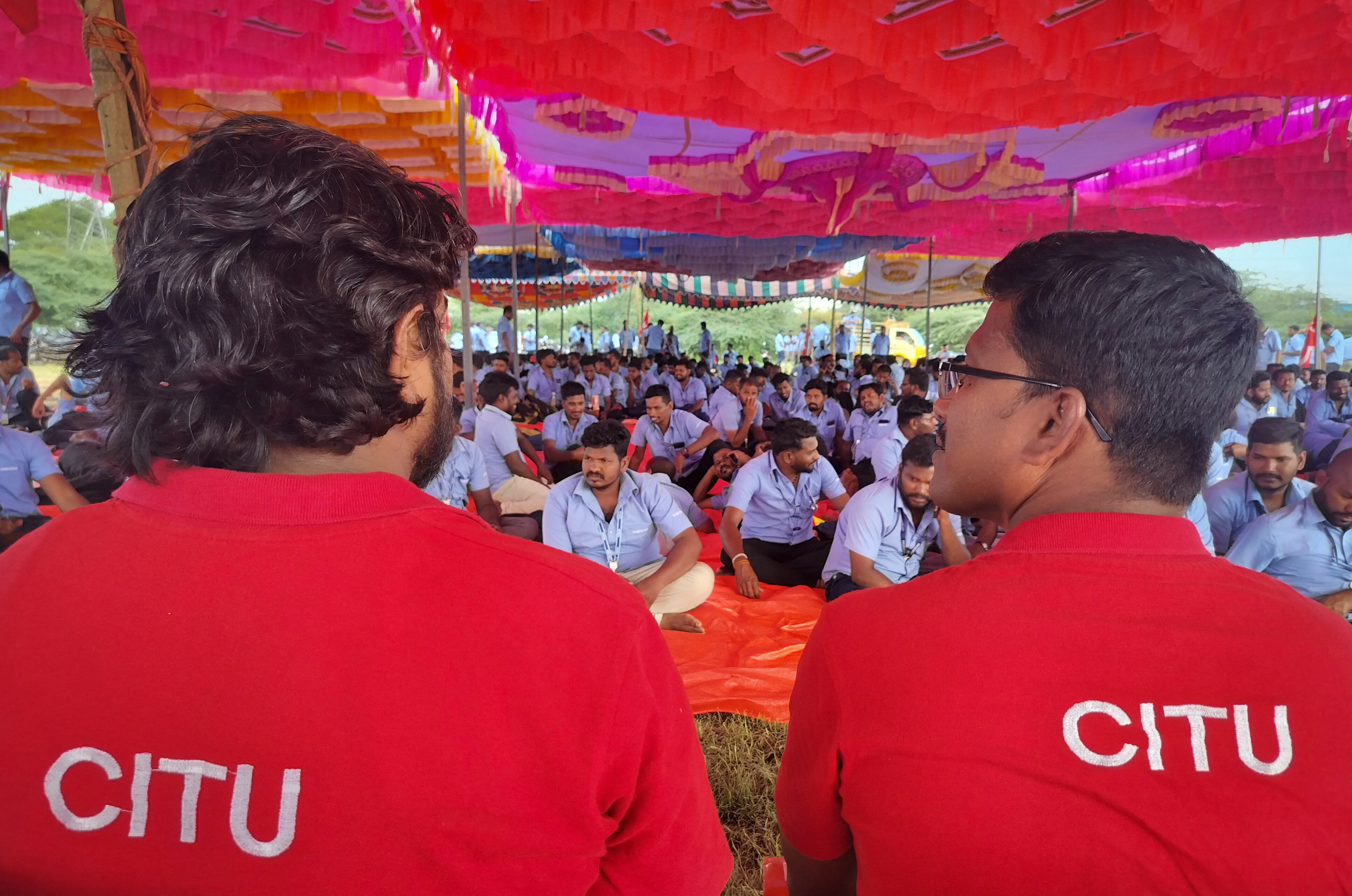Samsung Workers Protest in India: The Struggle for Better Wages, Working Conditions, and Union Recognition
Samsung India Electronics, one of the biggest names in the global electronics market, is currently facing a wave of worker unrest in its Indian manufacturing unit located in Chennai, Tamil Nadu. For nearly a month, workers have been striking, demanding better wages, improved working conditions, and the official recognition of their union. What began as a localized labor dispute is now gaining national attention as the workers’ demands remain unmet and the management stands firm.

Samsung India Electronics Private Limited established its manufacturing unit in Chennai in 2007. Since its inception, the facility has operated without a recognized workers’ union. The factory, like many others in India, is a key component of Samsung‘s global supply chain, responsible for producing a range of electronic products, including smartphones and home appliances. Over the years, the factory has grown in scale, but according to the workers, their wages and working conditions have failed to keep pace with the rising demands of their labor.
In 2023, after years of dissatisfaction with their wages, shift schedules, and treatment by management, workers formed the Samsung India Workers Union (SIWU), backed by the Centre of Indian Trade Unions (CITU). The union, which represents a significant portion of the factory’s workforce, is still waiting for official recognition from Samsung’s management, despite having formed over a year ago.

The ongoing protest at the Chennai facility was triggered by the workers’ demands for a three-year salary increase, improved shift allowances, paternal leave, and equal pay for workers with similar qualifications and duties.
The main demands of the SIWU-CITU include:
1. Three-Year Salary Increase: The workers are asking for a salary raise that would bring their wages up to ₹36,000 per month. They argue that the cost of living has risen substantially in recent years, and their current pay does not reflect these changes.
2. Increase in Shift Allowances: Workers are demanding an increase in shift allowances from ₹150 to ₹250, particularly for night shifts, which they argue come with additional physical and mental strain.
3. Paternal Leave: The union is pushing for an extension of paternal leave from three days to seven days, in line with global standards. Many workers believe that paternal leave is crucial for helping families during the early stages of childbirth, but the current policy falls short of what is needed.
4. Equal Pay for Equal Work: A key issue for the workers is the discrepancy in pay between employees with the same qualifications and job responsibilities. The union wants Samsung to adopt a policy of equal pay for workers performing the same duties, regardless of seniority or other factors.
The refusal of Samsung management to recognize these demands has led to the escalation of the strike. Workers have organized peaceful protests, marches, and token fasts to draw attention to their plight.
The company’s response to the workers’ demands has been lukewarm, at best. Samsung India Electronics has denied any wrongdoing and maintained that its wages and working conditions are in line with industry standards. The company has also denied reports, including one from Frontline on September 19, that it had sent “snack boxes” containing fruits and chocolates to striking workers as an attempt to discourage them from continuing their protests.
However, despite these denials, multiple reports suggest that Samsung management has indeed taken unconventional steps to dissuade workers from participating in the strike. Workers allege that management has been calling and visiting their families in an effort to pressure them to return to work. One employee, who has worked at the Chennai facility for over eight years, told Frontline that the company was sending snack kits with fruits and chocolates to workers’ homes, calling it an attempt to pacify their demands.
“They’re sending ‘snacks kits’ with fruits and chocolates to our homes, calling and visiting family members to discourage strike participation,” the unnamed employee said. While such acts might seem benign, many workers feel that these gestures are attempts to dilute their protest and undermine their collective demands.
Last month, Samsung Electronics management issued a warning to striking workers, stating that they would not receive wages if they continued to strike. Moreover, the company hinted at the possibility of terminating workers who refused to return to their duties. This has further intensified the tension between the workforce and management, as workers view these warnings as threats to their livelihood.
The Samsung India Workers Union (SIWU) has been instrumental in organizing and sustaining the strike. Despite having formed last year, the union has not yet been officially recognized by the company, a fact that has only fueled the workers’ determination to continue their protest.

The union is backed by the Centre of Indian Trade Unions (CITU), one of the largest trade union federations in India. CITU has been vocal in its support for the workers, stating that Samsung’s refusal to recognize the union is a violation of the workers’ rights. The SIWU-CITU has also criticized the company’s treatment of its workers, stating that the management is more focused on maintaining production levels than addressing the legitimate concerns of its workforce.
As the strike enters its second month, the workers are showing no signs of backing down. On October 2, in a symbolic move, the workers observed a token fast near the factory. This event was part of the union’s strategy to escalate the protest without resorting to violence or disruptive actions.
The protest has garnered attention from various labor rights groups across the country, many of whom see the strike as part of a broader struggle for workers’ rights in India’s manufacturing sector. The workers’ demands are not only about better wages but also about respect, dignity, and fair treatment.
For Samsung, the strike comes at a critical time. The Chennai facility is an essential component of its production chain, and any disruption could impact its ability to meet market demand, particularly as the festive season approaches in India. Moreover, Samsung’s reputation as a responsible employer could take a hit if the company is seen as ignoring the welfare of its workers.
However, for the workers, this strike is about much more than just wages and allowances. It is about securing their rights, gaining recognition for their union, and achieving fair treatment in the workplace. The outcome of this strike could set a precedent for labor relations in India’s electronics manufacturing sector.
As the standoff between Samsung and its workers continues, the company must decide whether it will address the workers’ concerns or continue to resist their demands. For now, the workers remain united in their cause, determined to fight for the changes they believe are necessary.

